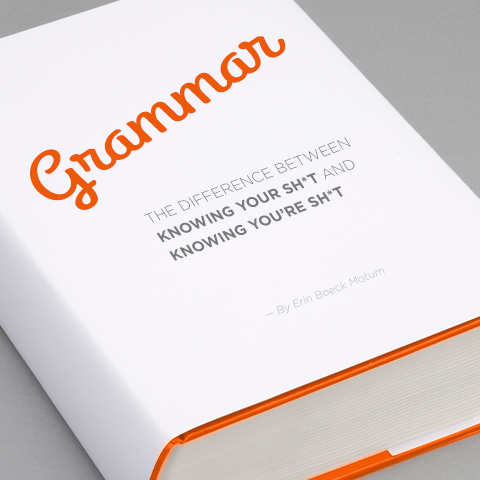OK, if this topic makes you want to run for the hills and forget everything your English teacher once taught you, I get it. Grammar, punctuation and style can be complicated issues. But knowing the rules and knowing when to break them are key skills that will help you avoid mockery on the Internet.
There are the obvious blunders. Have you seen the pictures of McDonald’s signs advertising their new Anus burgers? Nobody wants to eat those! But Angus burgers, now those have some appeal. Or what about the Mitt Romney’s “A Better Amercia” poster? These sorts of issues could easily be avoided entirely with a bit of care.
I love grammar rules as much as the next … well, as much as most grammar nerds do. But I do think some rules are meant to be broken. Starting a sentence with a conjunction? Not a problem. Think you can’t end a sentence with a preposition? That’s a huge grammar myth. The biggest thing is to be consistent. And that’s where style comes in.
Each brand has its own voice, its own personality. And you can convey that personality through the words you choose, through the way you structure your sentences. Some would argue that Apple’s “Think Different” slogan is grammatically incorrect, but that wording was deliberately crafted to convey a message. Apple didn’t want you to think differently, per se; they wanted you to think of people who were different. Ideas that were different. They wanted you to look at things in a different way, to look at Apple in a different way.
Language is evolving as we speak, and that’s nothing new. The way we used to write (or talk) isn’t really how we communicate now. (For fun, check out these pop songs written in Shakespearean English.) But hiding behind the argument that English is evolving, that it was autocorrect’s fault or that text speak is so common that we don’t need to worry about errors is bad for business. Some people question whether grammar is actually that important in a time of social media, quick texts and informal writing, and sometimes it’s not the end of the world. Yes, we all make mistakes from time to time, but you don’t want to do it often (or in a big way). Error-free writing can help make sure companies trust you with their brand, since sloppy writing can actually decrease credibility and make you look unprofessional. A UK poll even found that 59 percent of residents surveyed reported that they would avoid doing business with a company that had grammar errors in their online communications.
Grammar can be difficult, but big errors can be minimized with a bit of due diligence. In the modern times of social media and autocorrect, yes, we have more tolerance for some errors — but only in some situations. Consumers and clients will assume you’re not credible if you make silly errors. So how to decide what’s important? Know your audience, listen to your copy editor and, if you’re going to break the rules, make sure you have a solid reason why.
Still need some advice to save your wordy ass? Before you hit send, stop. Doing the following checks could be the difference between campaign success and becoming a heavily mocked Internet meme:
- Run spell check to catch any glaring errors (although you should really only trust spell check about as much an e-mail from that Nigerian prince who needs help smuggling money).
- Read the piece through to make sure you didn’t type “one” when you meant to write “once” or something silly like that. I find it helps to read from start to finish for readability and flow, then read from the the last word to the first to check for spelling errors.
- Consider having someone else (preferably a copy editor or someone who knows more about the rules of writing) look at the copy with fresh eyes. What was so clear to you might not be clear to everyone else, and they might realize that you actually spelled someone’s name wrong or used it’s when you should have used its.
- Use the power of Google to make sure your facts are correct. Check the spelling of names, companies, cities and any other proper nouns. And, if you’re using a hashtag, make sure it’s clear that you’re actually talking about eating a treat rather than the verdict of a murder trial.
Have a grammar question or want me to have a look at something? Send me an e-mail. (Yes, I’m personally a bit old school and still prefer the hyphen.) I’d be happy to help.


